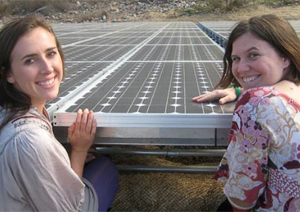SDSU Launches Green Degree
The new sustainability degree will explore the cultural values that shape resource use, consumption and governance.

There's no denying the importance of sustainability in the 21st century and San Diego State students have led the charge in turning the campus green.
In recognition of this, SDSU has created a new, multidisciplinary major in the College of Arts and Letters. Students will be able to enroll in the new sustainability major beginning next fall.
The emergence of a degree offering was a logical step, said Matt Lauer, professor in the SDSU Department of Anthropology who will co-direct the sustainability program with geography professor Trent Biggs.
Campus committed to sustainability
“This has been building for some time,” Lauer said. “There has been a lot of interest, starting with our students, for this type of degree. And so after several years of talking about it, we finally put together a proposal to make it happen, and it was approved very quickly.”
Student-led organizations, such as e3 and the Associated Students’ Green Love initiative, have driven the sustainability movement on campus for several years. SDSU facilities have increasingly added sustainable features, including a campus bike path, solar photo-voltaic arrays and an on-campus organic garden.
On the academic side, programs across campus have incorporated sustainability-related curriculum and hired faculty members with expertise in the area. The university also created the Center for Regional Sustainability to identify, define and address the region’s most critical issues.
“The creation of a sustainability major in the College of Arts and Letters demonstrates San Diego State’s commitment to this important issue,” said Paul Wong, dean of the College of Arts and Letters.
“The efforts of our students, faculty and staff have been making an impact on campus life for some time. We plan also to work closely with the private, public and non-profit sectors in building this major, including research and community outreach. This program will produce graduates who will have significant impact on sustainability in this region and the world.”
“To really implement sustainability, you need to be able to talk to both scientists and policy makers.”
A multidisciplinary approach
Lauer emphasized that the major is multidisciplinary with students taking courses in the humanities, social sciences and natural sciences. Students who major in sustainability will learn diverse approaches, techniques and modes of thinking.
Sustainability meets the environmental, economic and social needs of today without compromising the needs of the future. Achieving it requires a new type of student and professional who has knowledge in a wide range of subjects.
“The major’s multidisciplinarity is necessitated by the fact that sustainability is not something that can be understood from one academic discipline,” Lauer said. “It involves complex social, environmental, political and ethical challenges.”
Much more than technical issues
Sarah Elkind, a history professor who led the effort to create the new major, said that in order to fully understand sustainability, students in the major will not just study how to conserve energy or reduce carbon emissions, but will investigate the cultural values that shape resource use, consumption and governance.
“To really implement sustainability, you need to be able to talk to both scientists and policy makers,” Elkind said.
The new sustainability major will train students to bridge this divide, and will prepare them for careers in sustainable business, public policy, environmental education and other fields. The university sees this commitment to sustainability as part of its responsibility to find solutions to the challenges of the 21st century.
Support the College of Arts and Letters



